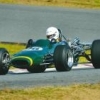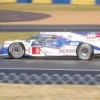
Ilmor-Mercedes V10 engines
#1

Posted 06 December 2009 - 03:24
Advertisement
#2

Posted 06 December 2009 - 04:25
I'm having tremendous trouble finding media that isn't spoken over.
This has more to do with how the different audio channels are mixed for broadcast, rather than an engine being
Edited by primer, 06 December 2009 - 04:28.
#3

Posted 06 December 2009 - 08:43
This has more to do with how the different audio channels are mixed for broadcast, rather than an engine being
particularlytremendously loud.
I think it was probably all in the exhaust system.
Dale.
#4

Posted 06 December 2009 - 08:53
#5

Posted 06 December 2009 - 08:56
#6

Posted 06 December 2009 - 09:30
#7

Posted 06 December 2009 - 11:49
I also remember the extremely loud and harsh note from the Peugeot engine in the Prost, I couldn't stand in their garage even with my fingers firmly shoved in my ears.
F1 Racing magazine did a very nice free CD of all the current F1 engines in the February 2003 edition - there was no commentary to spoil the wonderful sounds.
David
Edited by David Lawson, 06 December 2009 - 12:00.
#8

Posted 06 December 2009 - 12:29
I would like to hear that! Surely pitch is a function of revs, but the sound can change in other ways for other reasons. I think it was Keith Duckworth who said of the Matra V12 - "Most of the power is coming out of the exhaust!" or similar.F1 Racing magazine did a very nice free CD of all the current F1 engines in the February 2003 edition - there was no commentary to spoil the wonderful sounds.
#9

Posted 06 December 2009 - 18:52
That CD in F1 Racing would be brilliant if anyone could get it uploaded via torrents somewhere.
#10

Posted 06 December 2009 - 20:52
#11

Posted 06 December 2009 - 21:13
As victor_RO mentioned in post#5, aluminium-beryllium, since banned, but I still don't see how that can change the sound. I wait to be enlightened...Wasnt it to do with som,e exotic material that later got banned, um, Berylium or something? I`m sure it was mentioned that this attributed to the unique sound.
#12

Posted 07 December 2009 - 18:31
As victor_RO mentioned in post#5, aluminium-beryllium, since banned, but I still don't see how that can change the sound. I wait to be enlightened...
As far as I could find out, the now-banned materials enabled a longer stroke at the same amount of revs as the rivals. I suspect that the engine's bore/stroke does have some kind of bearing on the sound it produces, along with the way the exhausts are configured.
#13

Posted 07 December 2009 - 23:37
I'm sure these things affect the 'sound' but also I feel sure that pitch is purely dependent on revs.I suspect that the engine's bore/stroke does have some kind of bearing on the sound it produces, along with the way the exhausts are configured.
#14

Posted 07 December 2009 - 23:42
Pitch (i.e. frequency) must depend solely on number of cylinders and revs.I'm sure these things affect the 'sound' but also I feel sure that pitch is purely dependent on revs.
#15

Posted 07 December 2009 - 23:50
Don't different materials give different resonances ?Wasnt it to do with som,e exotic material that later got banned, um, Berylium or something? I`m sure it was mentioned that this attributed to the unique sound.
twink a crystal glass and it gives a distinctly different "ping" than does normal glass.
Let certain pieces of metal drop on the workshop floor and I am sure there is difference in "thud"
I mean a lumpalead would sound like plop
whereas a dainty stainless lock thingy would give more pling
regardless of mass (unless you drop it on your big toe) I believe metals have a different sound "characteristic"
#16

Posted 07 December 2009 - 23:52
Yep, 12,000 rpm = 200rps = 100 firing strokes /sec x 10 cylinders = 1,000Hz. Is that right? I can't 'audiolize' what 1,000Hz sounds like, but it seems a bit low.Pitch (i.e. frequency) must depend solely on number of cylinders and revs.


















